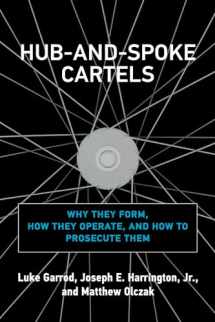
Hub-and-Spoke Cartels: Why They Form, How They Operate, and How to Prosecute Them
Book details
Summary
Description
Product Description
The first comprehensive economic and legal analysis of hub-and-spoke cartels, with detailed case studies.
A cartel forms when competitors conspire to limit competition through coordinated actions. Most cartels are composed exclusively of firms that would otherwise be in competition, but in a hub-and-spoke cartel, those competitors (“spokes”) conspire with the assistance of an upstream supplier or a downstream buyer (“hub”). This book provides the first comprehensive economic and legal analysis of hub-and-spoke cartels, explaining their formation and how they operate to create and sustain a collusive environment. Sixteen detailed case studies, including cases brought against toy manufacturer Hasbro and the Apple ebook case, illustrate the economic framework and legal strategies discussed.
The authors identify three types of hub-and-spoke cartels: when an upstream firm facilitates downstream firms to coordinate on higher prices; when a downstream intermediary facilitates upstream suppliers to coordinate on higher prices; and when a downstream firm facilitates upstream suppliers to exclude a downstream rival. They devote a chapter to each type, discussing the formation, coordination, enforcement, efficacy, and prosecution of these cartels, and consider general lessons that can be drawn from the case studies. Finally, they present strategies for prosecuting hub-and-spoke collusion. The book is written to be accessible to both economists and lawyers, and is intended for both scholars and practitioners.
Review
“This important and original study reveals the complex motivations and activities of hub-and-spoke conspiracies, incorporating both lucid theoretical analysis and detailed applications to a variety of modern cases.”
—
William H. Page, Marshall M. Criser Eminent Scholar, University of Florida Levin College of Law
“Hub-and-spoke cartels pose greatly understudied challenges for antitrust scholars and enforcement. This impressive book breaks new ground by laying out the theory and describing the practice of these cartels in ways that can be appreciated by both economists and lawyers.”
—
Thomas W. Ross, UPS Foundation Professor of Regulation and Competition Policy, Sauder School of Business, University of British Columbia
About the Author
Luke Garrod is Senior Lecturer in Economics at the School of Business and Economics at Loughborough University in the UK. Joseph E. Harrington, Jr., is Patrick T. Harker Professor at the Wharton School of the University of Pennsylvania and author of
The Theory of Collusion and Competition Policy (MIT Press) and other books. Matthew Olczak is a Senior Lecturer in Economics at Aston University in the UK.


We would LOVE it if you could help us and other readers by reviewing the book
Book review



